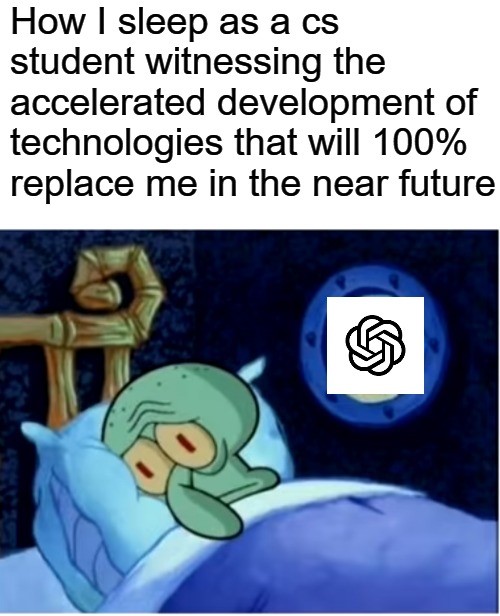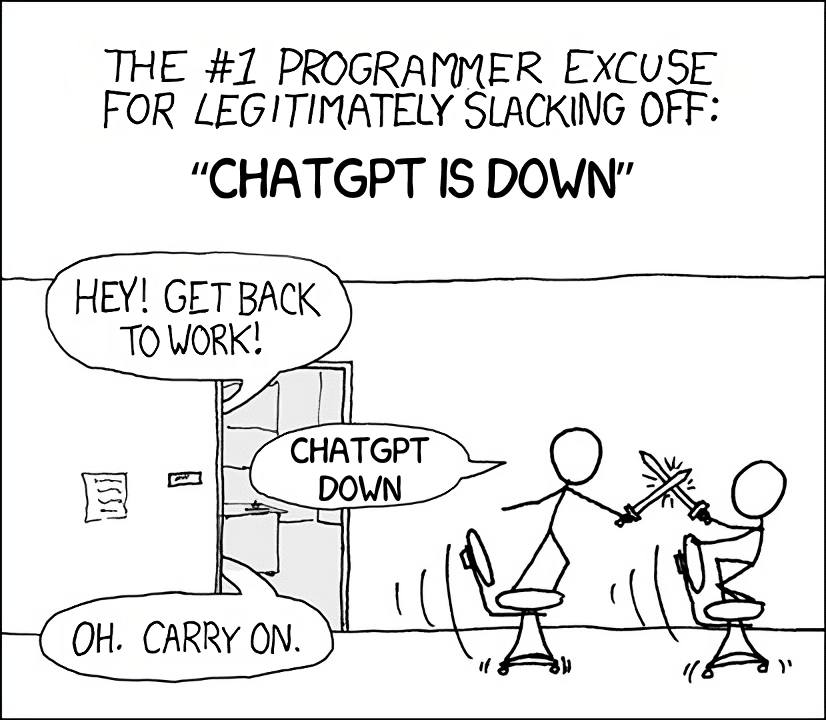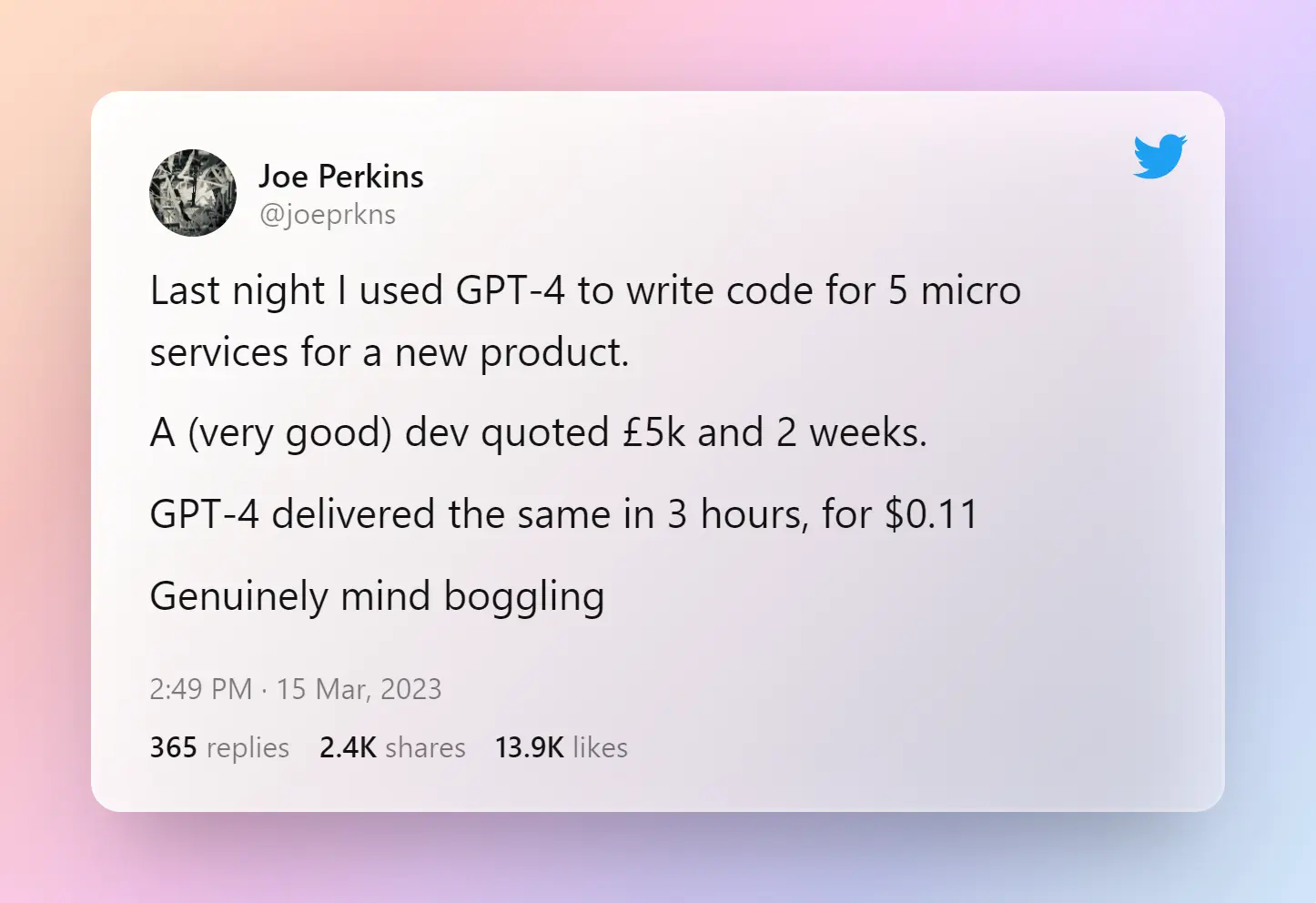Following its release last week, many users have noticed GPT-4’s advanced coding capabilities. OpenAI’s latest version of the large language model has been able to code games like Pong and create simple apps when given prompts written in conversational English. This has led to widespread concern from computer science students and software developers who fear AI will soon render their jobs obsolete.
In fact, one of the most popular posts on the a subreddit, with almost 40,000 upvotes, is titled “Truly the best time to be a cs [computer science] student.” The post features a meme of Squidward looking anxious and sleepless, with the OpenAI logo in the background, accompanied by the caption, “How I sleep as a cs student witnessing the accelerated development of technologies that will 100% replace me in the near future.”

However, computer science researchers and developers say that GPT-4 is more likely to enhance productivity and become a useful tool for developers rather than entirely replacing human developers. While AI may indeed replace certain junior-level development positions, it is unlikely to become a total substitute for human developers.
According to David Joyner, the Executive Director of Online Education and Online Master of Computer Science at Georgia Tech, models like GPT-4 are akin to calculators for math when it comes to coding.
“I’ve used GPT for various scripting and writing tasks since its release, and in every instance, it has saved me significant time. However, I still had to use my own expertise to finish the process,” Joyner explained. “Very little of my knowledge has become obsolete; it just needs to be directed towards a narrower slice of the problem.”
Joyner believes that ChatGPT’s primary impact on product development will be to increase efficiency and make developing a fully functional product significantly less expensive.

In response to GPT-4’s release, Joe Perkins, the founder of Landscape, a startup that creates tools for VCs, stated, “Last night, I used GPT-4 to write code for five microservices for a new product. A skilled developer quoted £5k and two weeks. GPT-4 delivered the same in 3 hours for $0.11. Genuinely mind-boggling.”
Perkins shared that GPT-4 not only wrote the scripts but also provided detailed instructions on how to set up and run them on Replit. Perkins found it easy to use and even asked it to add comments to key parts of the code.
Despite studying computer science at university, Perkins admitted that he lacked the expertise to program the code efficiently, which is why GPT-4 was incredibly helpful. The developer he mentioned in his viral tweet also confirmed that GPT-4 saved him two days of work, ultimately saving Perkins money.
While Perkins acknowledged that we might not be at the point where Google engineers have their code written by OpenAI for use by billions of people, he emphasized that for early-stage startups like his, product scrappiness is critical. GPT-4 has enabled him to pick up tickets and get them almost to the integration point, ultimately saving time and money since he didn’t have to hire additional resources.
Perkins anticipates that GPT-4 will revolutionize education by simplifying the process of writing, testing, and explaining code to users, making coding more accessible to those with limited technical knowledge.
Joyner shares this sentiment, suggesting that GPT-4’s ability to provide individualized tutoring for coding will enable students to learn in a self-guided, informal manner. While some students may use GPT-4 to obtain ready-made answers, Joyner hopes that more students will utilize it as a resource to help them understand the underlying principles.
According to Joyner, although coding is already a relatively democratized profession due to the abundance of online tutorials, GPT-4 has the potential to make it even more accessible.
Perkins shared an example of how GPT-4 can empower people with no technical background to build tools previously only possible with coding skills. He explained that his friend, who works with coders but lacks technical expertise, used GPT-4 to make a chrome extension that translates highlighted text on a webpage into any language in just 15 minutes.
According to Perkins, his friend was thrilled and now has many more ideas for tools he wants to build, thanks to the accessibility provided by GPT-4. Perkins believes that GPT-4 will democratize coding and make it more accessible to people who may not have had the time or resources to learn to code.
Amjad Masad, CEO of Replit, an online platform for collaborative coding, also sees the potential for AI-powered coding to transform the skill and make learning easier. He believes that GPT models will serve as a tool for people with coding knowledge, sparking exponential growth in productivity.
In the end, while AI in its current form may not replace all software developers, it will significantly impact the number of products being created and the accessibility of software development. It will also encourage people to develop their skills in using AI, including learning prompt engineering, which is key to efficiently using language models.
Joyner noted that while AI may be able to do any human skill or better than humans, replacing the product does not replace the sense of personal fulfillment that comes with the creative process.
“When we talk about Midjourney replacing painters or GPT-4 replacing novelists, we assume that the goal of these endeavors is the product itself. But humans do not solely paint and write and compose because of what they can do with what they create; they do so because the art of creation itself is personally fulfilling,” Joyner said.
Joyner also believes that software engineering will be among the last skills to be broadly replaced by AI, even with its unique aptitude for coding. This is because the principles underlying GPT and other AI technologies are public knowledge, and the skills themselves allow new individuals or organizations to enter and stake an independent claim in increasingly AI-dominated fields.
What do you think, “Will GPT-4 replace programmers”? Please share your thoughts wherever you find this story.
Related Stories:

